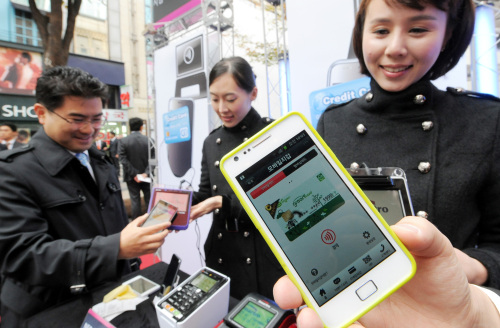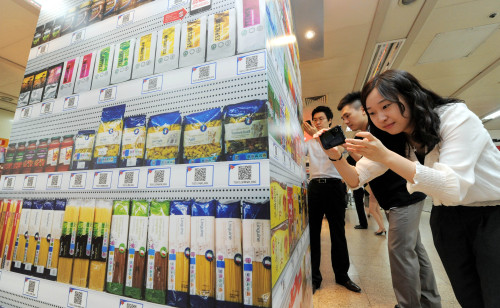On the nation’s busiest shopping street in Myeong-dong, central Seoul, visitors do not need to pull out their wallets to make a purchase at some 200 stores.
As the area has recently been designated a trial zone for near-field communication-based mobile payments, they can simply swipe their smartphones to pay or use royalty points.
In addition to mobile payments, an NFC door at a theater puts smartphones in vibration mode automatically, while lining up for an order is also unnecessary at some cafes thanks to a NFC-equipped menu.
As the area has recently been designated a trial zone for near-field communication-based mobile payments, they can simply swipe their smartphones to pay or use royalty points.
In addition to mobile payments, an NFC door at a theater puts smartphones in vibration mode automatically, while lining up for an order is also unnecessary at some cafes thanks to a NFC-equipped menu.

“We are the first to start such full-fledged NFC service in the world. We will lead the global market,” Choi See-joong, chairman of the Korea Communications Commission, said during the launching event on Nov. 11.
Wireless transactions, enabled by NFC and other barcode technologies, are gaining momentum in Korea, along with the fast adoption of high-end handsets among people here.
The number of Korean smartphone users hit the 20 million mark at the end of October, according to the telecommunication regulator.
Taking advantage of the recent trend among tech savvy consumers here, local telecom companies have already jumped into the “mobile wallet war.”
SK Telecom, the nation’s largest telecom carrier, was the first to launch its mobile app SmartWallet in June last year, which replaces plastic membership cards and royalty point stamps at stores of about 100 brands.
The number of downloads, which are available both on the Android operating system and iOS, exceeded 3 million early this month, the company said.
“The future outlook for wireless transactions seems promising,” said Lee Ho-yeon, a PR manager at SK Planet, the mobile platform unit of SK Telecom.
“It meets all the interests of stake-holder groups such as telecom companies, credit card firms, merchants and consumers.”
She said, however, it would take some time for NFC payment to become more commercialized as related infrastructure and handsets equipped with the chip are currently limited.
The NFC chip is embedded in some smartphone models such as Galaxy S2, Vega Racer, Nexus S and long-term evolution phones and the number of service users is estimated to be at 140,000.
“A new wave of smartphones, outfitted with the NFC technology, will come out by the end of this year, boosting the market,” Lee said.
KT Corp., the nation’s No. 2 telecom carrier, also introduced its new app Olleh myWallet this month, which is equipped with similar functions as SK’s SmartWallet.
The app running only on the Android OS plays the role of transportation card and other membership cards of chain stores.
The company also launched a NFC-equipped case for iPhone4 and iPhone4S so that the owners can use the NFC payment service, which is offered only on some smartphone models.
The company also plans to enable the app’s overseas use. For example, the app user would be able to use mobile membership points at Starbucks stores around the world soon.
Regarding security concerns about mobile payment, Kim Yoon-jeong, an assistant manger at KT, said that mobile credit cards could be safer than traditional payment methods.
“When it is stolen, anyone can swipe the plastic card. But the mobile card requires a password to proceed with any transaction,” she said.
When it comes to the local retail sector, Homeplus, the nation’s No. 2 supermarket chain owned by U.K.-based Tesco, is leading in the mobile shopping experiment.
Homeplus in October opened a so-called virtual store in a busy Seoul subway station, in which there are no salespeople, shelves, cashiers or even products.

Shoppers scan products on posters displayed on pillars and screen doors with their smartphones and a black and white Quick Response code on each image identifies the product and the consumer and arranges a delivery.
When Google chairman Eric Schmidt visited Seoul early this month, he called the Homeplus idea “one of the best stories I’ve ever heard.”
Since Homeplus launched a shopping app in April, its mobile sales surged from 30 million won in May to 140 million won in October, a 366 percent rise, the company said.
The number of downloads increased from 630,000 to 730,000 after the virtual store opened. And the figure is expected to hit the 2 million mark early next year, the company said.
Search giant Google is also preparing to use the Korean market as a test bed for its mobile debit card Google Wallet, which is currently available only in New York and San Francisco since its launch in May.
Mobile transactions apps including Google Wallet, were one of the key topics that the Google chief is believed to have discussed with heads of local telecom operators on his visit here.
According to the SKT official, a “working group” has been formed to discuss the details and SKT is the sole participant as a telecom carrier.
By Lee Ji-yoon (jylee@heraldcorp.com)
-
Articles by Korea Herald







![[Hello India] Hyundai Motor vows to boost 'clean mobility' in India](http://res.heraldm.com/phpwas/restmb_idxmake.php?idx=644&simg=/content/image/2024/04/25/20240425050672_0.jpg&u=)










